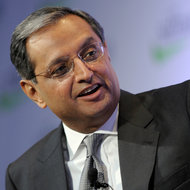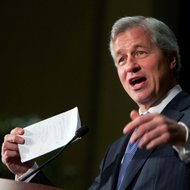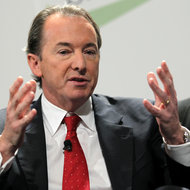Wall Street stocks and profits took a beating in 2011. But there is one corner of the Street that took a lighter hit: the compensation paid to chief executives.
Three big banks disclosed on Friday what their top executives will receive in deferred stock for their work in 2011. Such stock is expected to make up most of their bonus as banks are increasingly paying employees more in deferred stock. Those awards to top bank executives are coming as lower-level employees are finding out that their own bonuses will be much smaller than a year ago.
Brian Foley, a compensation expert in White Plains, said that for top executives, he would have expected “the belt to come in a few more notches” this year given the banks’ lackluster stock performance. He added that executive suite pay packages this year might further lower morale inside the banks.
“A lot of people in the middle took big hits this year,” he said. “It could create some big ‘us versus them issues’ as to why the rank and file are taking a bigger hit than the senior executives.”
 Peter Foley/Bloomberg NewsVikram S. Pandit, chief of Citigroup.
Peter Foley/Bloomberg NewsVikram S. Pandit, chief of Citigroup.
The chief executive of Citigroup, Vikram S. Pandit, was awarded deferred stock in the bank valued at $3.7 million based on the company’s current price, according to a regulatory filing. This is on top of his annual base salary of $1.75 million, and brings his disclosed pay so far for 2011 to $5.45 million.
Citigroup is expected to disclose the rest of his pay, cash, be it upfront or deferred, in March. In addition, while not necessarily for work performed in 2011, Mr. Pandit last year was awarded a $16.7 million retention bonus, plus stock options that could add $6.5 million to the package’s overall value.
To be sure, Mr. Pandit has gone through some lean days, at least by Wall Street standards. In 2010, he was paid just $1, a salary he agreed to take until Citigroup returned to profitability, which it did that year.
While Citigroup was profitable again last year — earning $11.3 billion — it was far from a banner year for the big bank as it and its rivals had revenues dip amid economic troubles abroad and a sluggish domestic economy. Citigroup’s stock fell 44 percent in 2011, and many employees were told this week they would be receiving no or small bonuses.
 Randy L. Rasmussen/The Oregonian, via Associated PressJamie Dimon, chief of JPMorgan Chase.
Randy L. Rasmussen/The Oregonian, via Associated PressJamie Dimon, chief of JPMorgan Chase.
Shares of Citigroup’s rival, JPMorgan Chase, also had a rough year, falling almost 22 percent. Still, JPMorgan’s chief executive, Jamie Dimon, was awarded $17 million in equity-linked stock for his work in 2011, according to a regulatory filing. Last year Mr. Dimon received $17 million in equity awards around this time of year and his total pay for the year came to $23 million. His total pay is expected to be roughly the same this year, according to a person close to company but not authorized to speak on the record.
 Jin Lee/Bloomberg NewsJames P. Gorman, chief of Morgan Stanley.
Jin Lee/Bloomberg NewsJames P. Gorman, chief of Morgan Stanley.
Morgan Stanley’s shares dropped 44 percent in 2011. On Friday, it released details on all its chief executive’s pay. James P. Gorman is taking a 25 percent pay cut from 2010. Mr. Gorman will receive $9.7 million in deferred compensation for his work last year, according to a regulatory filing. This number includes $4.7 million in deferred cash and equity linked stock and an additional $5 million in restricted stock. In 2010, Mr. Gorman received $7.4 million in stock and his total compensation for the year was $14 million. These numbers include Mr. Gorman’s base salary of $800,000.
Citigroup also disclosed that its chief operating officer, John P. Havens, received a stock award valued at $3.47 million. Its consumer banking chief, Manuel Medina-Mora, got $2.64 million and its chief risk officer, Brian Leach, received an award valued at $2.36 million, according to regulatory filings.
At Morgan Stanley, pay for other senior executives was down roughly 20 percent. The wealth management chief, Gregory J. Fleming, and Paul J. Taubman, co-head of institutional securities, were both granted restricted stock valued at $3.4 million. Colm Kelleher, the other co-president of institutional securities, received restricted stock valued at $1.9 million. His grant is less because he is based in Britain and there are different requirements on the mix of his pay. Ultimately, he will receive the same as Mr. Fleming and Mr. Taubman, a company spokesman said. Morgan did not release how much deferred cash these senior executives will receive.
At JPMorgan, the head of investment banking, James E. Staley, was granted restricted stock valued at $7.8 million and he has options valued at an added $2 million. Mary E. Erdoes, head of asset management, received restricted stock valued at $7.1 million and a further $2 million in options.
Article source: http://feeds.nytimes.com/click.phdo?i=035753a40bf6486c324281bb763716c8
Speak Your Mind
You must be logged in to post a comment.